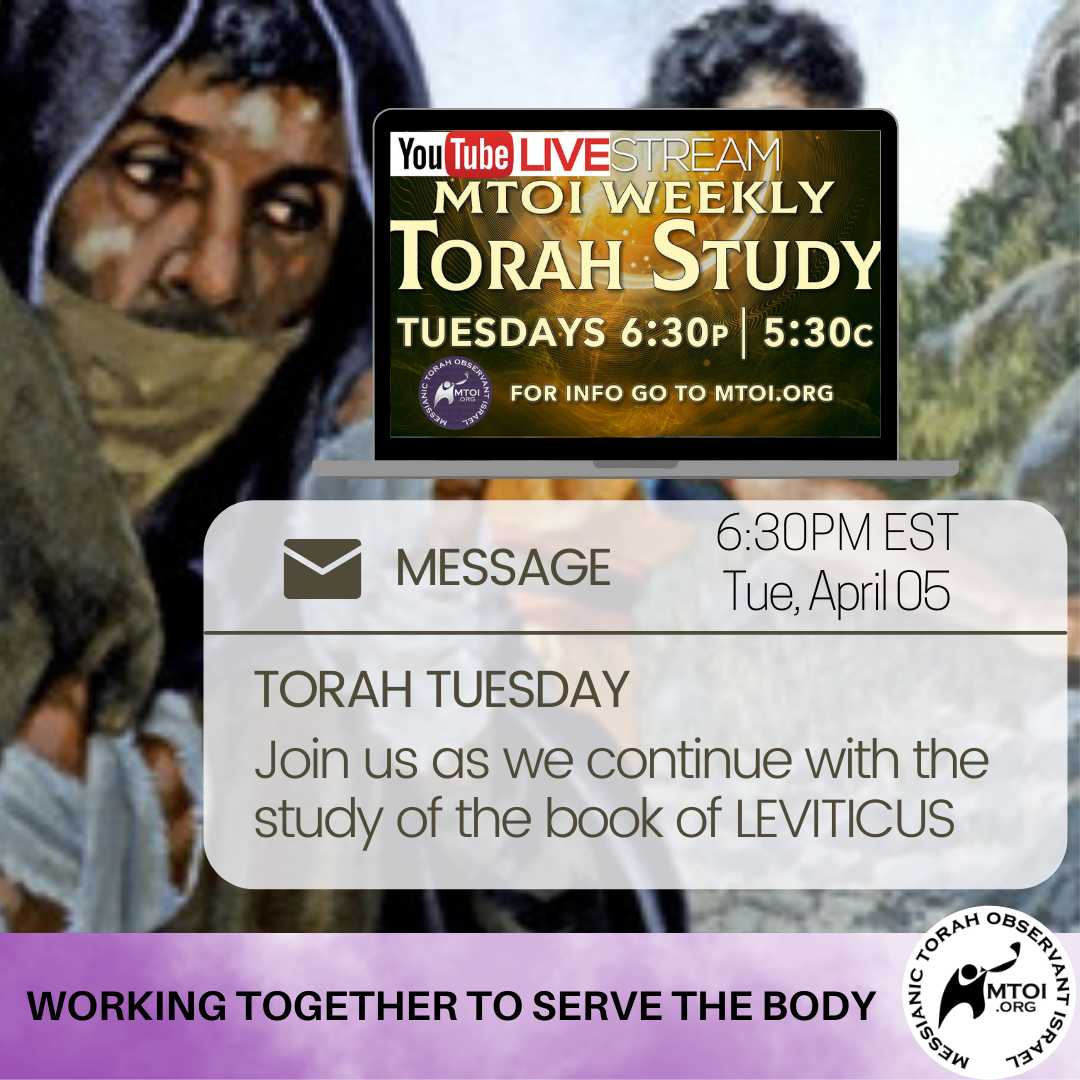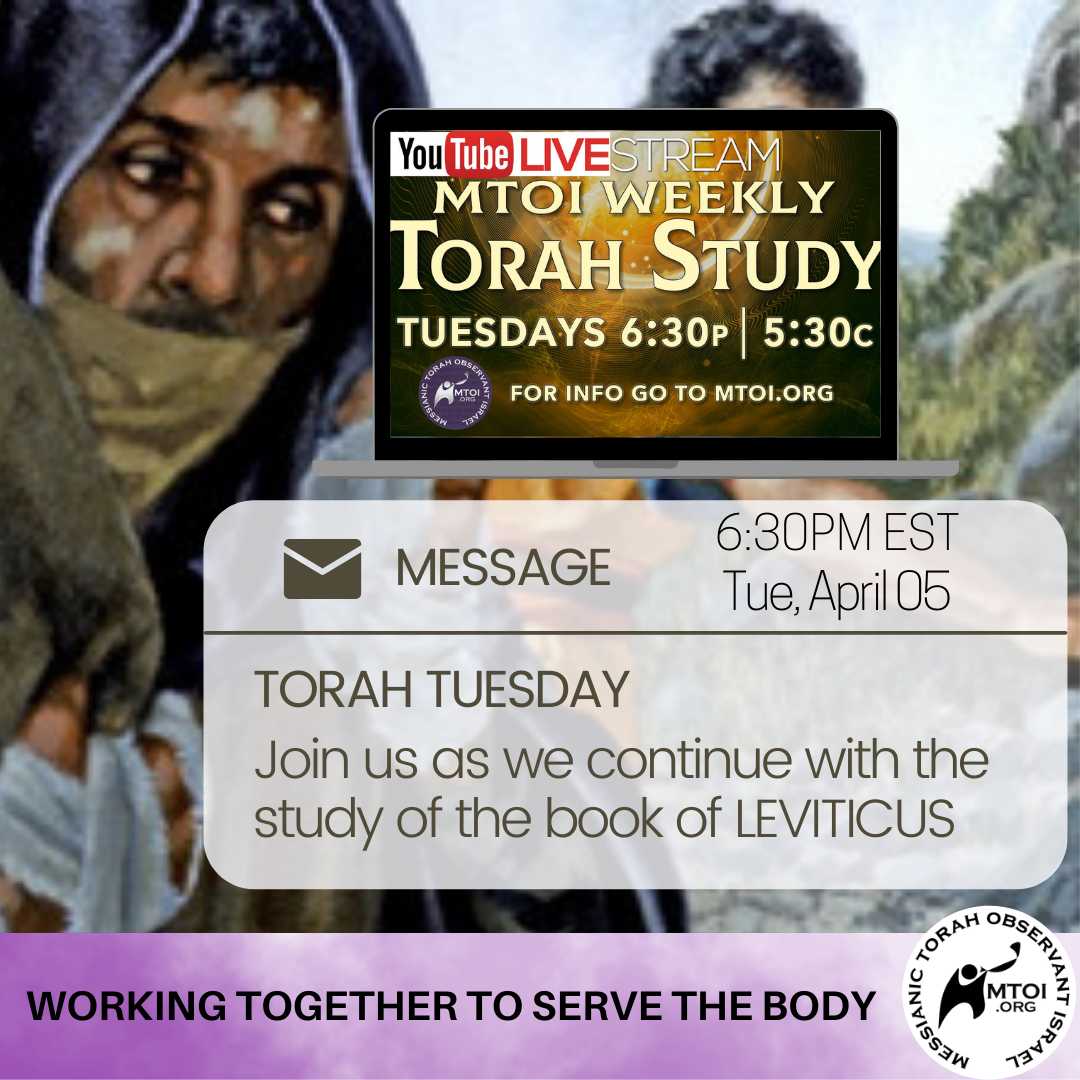Watch
Events
Articles
Market
More
Just as the laws of a leprous person aren't about Hansen's Disease, the laws of a leprous house in Leviticus 14 aren't about mold. Read the passage carefully. Mold doesn't fit the description.
Then the priest shall command that they empty the house before the priest goes to examine the disease, lest all that is in the house be declared unclean. And afterward the priest shall go in to see the house.
Leviticus 14:36
When your house is infected with tzaraat (leprosy possibly caused by evil speech), the only remedy is to empty the house and examine every part of your life in full public view. Without confession and repentance, there is no remission of sin.
If a house (or a person!) cannot be cleansed of spiritual disease, then it must be permanently separated from the rest of God's people, sometimes by total destruction.
Leviticus 14:45



In the ritual for cleansing a leper in Leviticus 14:5-7, one bird is killed and bled, while the second is dipped in the blood and set free. This is thematically connected to several other concepts and passages in the Bible.
-The one is #yeshua and the second is you and me. By his death we are cleansed from spiritual uncleanness and set free.
-Both birds are also metaphorically the same bird, and we are that bird. We must die to who we were and be resurrected into the freedom of #yeshua, dead to sin and "cleansed from all unrighteousness".
-Yeshua is also both birds, in that he shed his blood and died for us, but also rose from the grave and ascended to Heaven.
-The two birds are very similar to the two goats of Yom Kippur. One goat is killed and one goat is sent into the wilderness.



Blessed are the meek, because they shall inherit the earth.
And I, Yoḥanan, saw the set-apart city, renewed Yerushalayim, coming down out of the heaven from Elohim, prepared as a bride adorned for her husband.
And I heard a loud voice from the heaven saying, “See, the Booth of Elohim is with men, and He shall dwell with them, and they shall be His people, and Elohim Himself shall be with them and be their Elohim.
And Elohim shall wipe away every tear from their eyes, and there shall be no more death, nor mourning, nor crying. And there shall be no more pain, for the former matters have passed away.”



Speaking Biblically, uncleanness is Hebrew "tumah". Something that is unclean is "tamei". It doesn't mean that something is dirty or gross, but rather that it is associated with or has had contact with death or a loss of "life force". A dead body is tamei (unclean) because death imparts tumah (uncleanness). #leviticus



On this date in history, 04/05/1781: The Battle of Blanford, Virginia. #otd #tdih https://www.historycarper.com/....category/battles/ame



Link to service - https://youtu.be/Jo_hST4uMJM
Welcome to our weekly Torah Study, aka Torah Tuesdays. This week's Parsha is Metzora, Leviticus 14:1 - 15:33
Don't miss out on new teachings every week. Please click on the "LIKE" button if this video has been a blessing to you.
For more information about MTOI (Messianic Torah Observant Israel), visit our website at https://mtoi.org.
Join us on Social media!
Like us on Facebook: https://www.facebook.com/mtoiworldwide
Follow us on Instagram: https://www.instagram.com/mtoiworldwide/
Follow us on Twitter: https://twitter.com/mtoiworldwide
Join us on The Torah Network: https://social.ttn.place/mtoiworldwide
https://social.ttn.place/mtoisouthafrica
Join us on Telegram: https://t.me/mtoiworldwide and https://t.me/mtoisouthafrica
We are located in Cleveland TN, and have extension fellowships across South Africa. If you would like to know more about us, we would love to hear from you! Feel free to visit us on our website https://mtoi.org/mtoi-map/, to see where they are located, email us at contact.sa@mtoi.org or call us at 081 471 8940.
.
.
.
#Metzora #torahtuesday #torahstudy #Leviticus #Torah #Yahweh #Yeshua #Elohim #Messiah #messianic #torahobservant #mtoiworldwide #clevelandtn




Link to service - https://youtu.be/Jo_hST4uMJM
Welcome to our weekly Torah Study, aka Torah Tuesdays. This week's Parsha is Metzora, Leviticus 14:1 - 15:33
Don't miss out on new teachings every week. Please click on the "LIKE" button if this video has been a blessing to you.
For more information about MTOI (Messianic Torah Observant Israel), visit our website at https://mtoi.org.
Join us on Social media!
Like us on Facebook: https://www.facebook.com/mtoiworldwide
Follow us on Instagram: https://www.instagram.com/mtoiworldwide/
Follow us on Twitter: https://twitter.com/mtoiworldwide
Join us on The Torah Network: https://social.ttn.place/mtoiworldwide
Join us on Telegram: https://t.me/mtoiworldwide
We are located in Cleveland TN. If you would like to know more about us, we would love to hear from you! Feel free to visit us on our website https://mtoi.org, email us at admin@mtoi.org or call us at 423-250-3020.
.
.
.
#Metzora #torahtuesday #torahstudy #Leviticus #Torah #Yahweh #Yeshua #Elohim #Messiah #messianic #torahobservant #mtoiworldwide #clevelandtn



